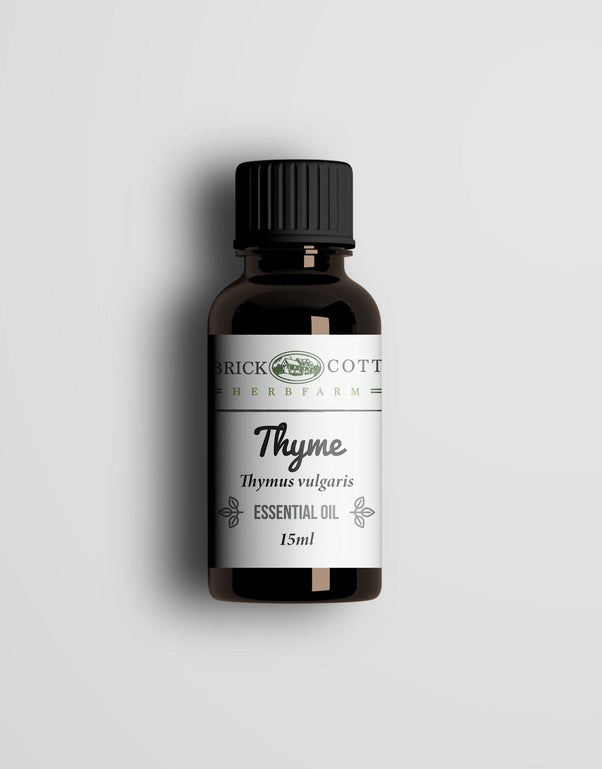Health Benefits of Thyme Essential Oil

While you might regularly use thyme in the kitchen, that’s not the only way to enjoy this incredible herb. Thyme essential oil has many benefits that extend well beyond its use as a seasoning. Distilled from the leaves & flowers of the thyme plant, this versatile oil is a popular choice for holistic practitioners, primarily because of its antimicrobial, anti-inflammatory, and other healing properties.
Today, we’ll explore the main health benefits of thyme essential oil. What’s in the oil itself? And how can it help you live a healthier, more natural life? We’ll cover some of the benefits we’ve already mentioned, as well as others, like how it can help heal your gut & your skin.
By the end of the guide, you’ll know how to use thyme essential oil to your advantage, as well as understand all the potential side effects and precautions to take.
The Basics of Thyme Essential Oil (EO)
Thyme EO is produced via steam distillation, a process where the leaves & flowers of the thyme plant are treated with hot, dry steam. This is one of the most common methods used to produce essential oils, where the heat forces the organic plant compounds to condense, where they’re then collected and bottled for use.

The oil itself has a distinct scent that is spicy, herbaceous, and warm. It has a thin consistency and though colour intensity may vary, it’s typically a pink/orange tone.
What’s In Thyme Essential Oil?
There are a number of active compounds in thyme EO, but the primary one is Thymol. It’s commonly used in insecticides and responsible for the herb’s distinct taste. It’s an expectorant that displays a number of anti-inflammatory, antiviral, antibacterial, and antiseptic properties, which is why it’s been a staple in traditional medicine for centuries.
The chemical composition of each essential oil will vary based on the species of thyme used, but the other two primary compounds are carvacrol and P-cymene. Carvacrol is an antioxidant and anti-inflammatory agent, which contributes to thyme’s skin healing properties. P-cymene also has antioxidant and anti-inflammatory properties, as well as being a known antiviral, anti-fungal, and antibacterial agent, contributing to the oil’s infection-fighting powers.
Health Benefits of Thyme Essential Oil
Antimicrobial Properties
Carvacrol has been shown to feature bactericidal activity that’s effective in preventing and treating infections. With thyme, the antimicrobial resistance may help in fighting any infections that your body is subjected to in its lifetime.
Recent studies have found that thyme is beneficial for its anti-fungal properties. Studies on anti-fungal properties have shown that thyme oil rich in thymol also limits growth of the fungal genus Cryptococcus, a pathogen responsible for cryptococcosis.
Respiratory Health Support
When it comes to respiratory health, it’s important to keep yourself healthy and this is a part of your health that you can’t afford to see deteriorate.
Thyme essential oil has an antispasmodic property which helps with mucus clearing, as well as providing antibacterial support. It’s therefore considered to be useful to those with existing respiratory issues such as coughs, sinus infections, and even bronchitis.
Improved Digestion
The antispasmodic properties that support your respiratory system also help prevent harmful gases in the stomach. These properties interact with the gastric enzymes within your digestive system, helping to relieve flatulence and soothe irritable bowel syndrome (IBS).
There are many studies that prove this to be effective, including how thyme’s used within the food industry. The study shown by NIH, states that thyme is one of the most effective herbs at fighting common pathogenic bacteria and lactic acid bacteria, further adding to its digestive strength.
Skin Health and Wound Healing
Thyme oil is known to be useful for protecting the skin from harmful bacteria and fungal infections, all of which can be useful for those with skin problems. As a home remedy for treating acne, healing eczema, wounds, and cuts, and relieving burns, it’s not a surprise that many swear by it.
In fact, studies have shown that thymol is more compatible with skin cells than conventional antibiotics and skincare chemicals.
How to Use Thyme Essential Oil
Thyme essential oil can be used in many ways, which if you’re using it for the first time, is handy to be aware of. With that being said, here are some tips on how to use thyme essential oil to your advantage.
Inhalation through steaming and diffusers is a great way to create a more relaxed state of mind and is the most effective method for improved digestive & respiratory support.
To heal wounds, relieve burns, and treat other skin conditions, we recommend topical application. To safely apply, mix 1-2 drops of thyme oil per teaspoon of carrier oil, then massage gently onto the affected area. You should also conduct a patch test before applying to a large or sensitive area, to avoid causing further irritation or pain.
If you plan to inhale directly from the bottle or add it to your diffuser, you should limit your exposure. Especially if you have high blood pressure or are sensitive to strong scents, these measures will reduce the likelihood of toxicity.
Using Thyme EO on a Daily Basis
Thyme essential oil is another oil that can be used on a daily basis and in a variety of forms. Here are a few suggestions if you’re looking to incorporate it into your daily life and routine.
- Add it to your diffuser to create a relaxed atmosphere
- Use it as a home remedy for aiding scratches and cuts
- Incorporate a few drops into your skincare for inflammation and acne
Precautions & Potential Side Effects
There are a number of precautions and potential side effects that come with the use of thyme essential oil. As mentioned above, toxicity can occur if you’re using too much of it for a prolonged period of time.
As a rule of thumb, check the product labels or consult your healthcare professional on how much you should be using and when to avoid it.
There are possible side effects like skin irritation and allergic reactions, which can be addressed with a patch test prior to use.
As mentioned, avoid using it if you have high blood pressure. Children shouldn’t be given thyme oil and it’s important to be aware of that when diffusing it into the air, particularly with pets in the home too.
If you’re pregnant, again talk to your healthcare professional for advice on whether it’s something you can use.
The health benefits of thyme essential oil are fantastic and should be embraced by anyone who has not used it to the fullest extent yet. While the raw herb is commonly used in cooking, there are so many more uses for it as an oil. From digestion to wounds, thyme EO can nearly do it all – so take the time to explore its benefits for yourself.



